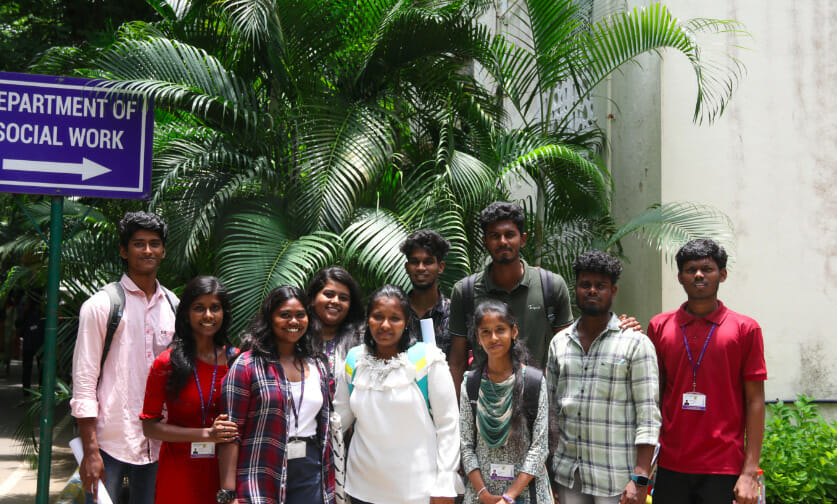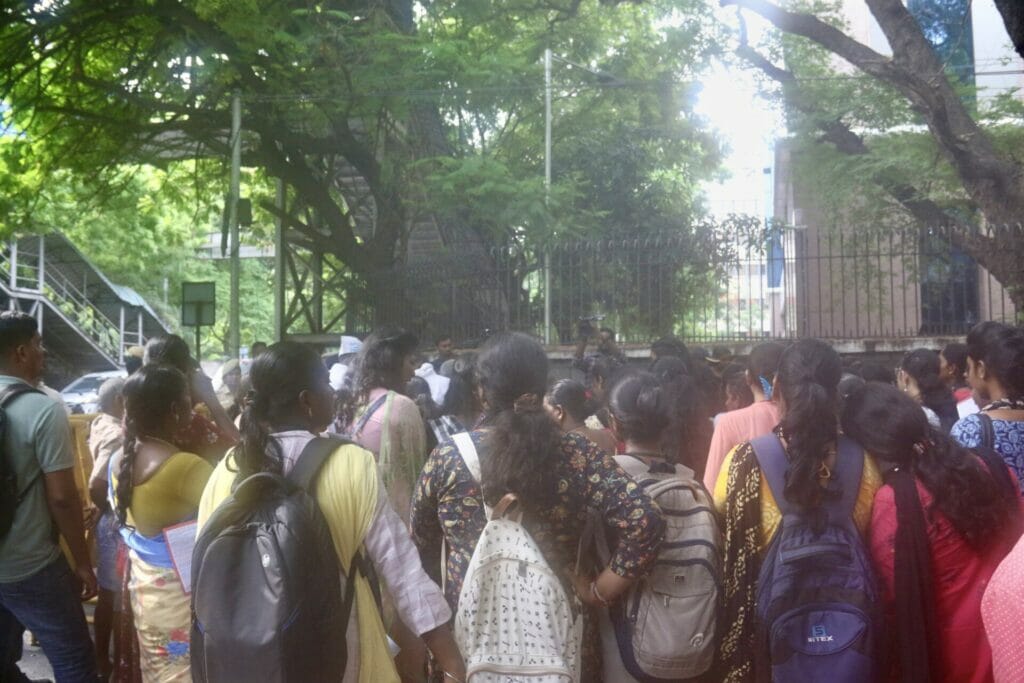Just a month ago, Madras University’s School of Sociology released a statement asking all of their postgraduate students to sign a form where they will agree to not participate in any political activities.
This request was in response to student’s participation in various protests this summer, mostly to do with violence in Manipur, a BBC documentary on Prime Minister Narendra Modi, and attacks on students of Jawaharlal Nehru University (JNU).
Once this statement was released, students refused to sign and agree to these conditions but felt limited in their options of speaking out against this action taken by the University. “The students are not willing to sign the form, but they are afraid to express their anger towards the administration, so they are not showing any kind of anger,” says Priya*, a student and a member of the Student Federation of India (SFI), a left-wing student organisation.
Priya explains that the University came out saying that any of these actions taken by the School of Sociology such as releasing a statement like this one, should be regarded as not “affiliated” with the larger Madras University.
These events are emblematic of a larger problem of the shrinking space for activism and dissent across colleges and universities, both public and private, across Chennai.
Underwhelming state of student activism in Chennai
At the Loyola College School of Social Work, around 20 social work students gathered this past month to discuss the state of student activism on campus.
By the end of the discussion, each of them stated that they had been feeling underwhelmed at the state of student activism in Chennai, agreeing that things could improve. The students discussed that they went into social work with the goal of being able to make social change but feel they can’t do much as students.

Currently, they are working on various social justice issues that they feel passionate about, one of these being the construction of a new airport in Chennai. They are concerned by this because its construction will displace “an entire village, and we already have an airport, what do we need another one for.”
In spite of initiatives like these being ongoing, students still feel their work in social change is greatly limited. “The maximum action we can do is sign a petition,” says Gokul, a social work student at Loyola. “They want us to know but they don’t want us to participate.”
But these restrictions on students are nothing new to Chennai. “Sometimes universities place a lot of pressure, but students normally don’t succumb to those pressures,” says Gladston Xavier, Professor of Social Work at Loyola College.
Restrictions on student activism in Chennai
In 2015, the government of Tamil Nadu enforced a ban on student union elections after two union groups physically fought one another.
Since then, students feel this action has had an overarching impact on having any sort of democratic space on campus. “Most students are apolitical. In 2015 student union elections were banned in Tamil Nadu, and due to that students are not involved in any political activities,” says Priya.
Gokul discusses what he believes to be the broader implications of this ruling. He says, “It’s an issue of the government because the government has a condition that there are no student elections. Politicians want to silence our voices, they don’t want us to come into power.”
Priya adds that the government involvement within campuses themselves goes further than banning things like student union elections. She says, “Our university vice-chancellors are appointed by the government, so they don’t allow any democratic spaces on campus. They are trying to restrict the student movement.”
Read more: Chennai seeks space for dissent amid restrictions on anti-CAA protests
Scope for student activism in Chennai colleges
Many universities have encouraged students to keep their activism limited to the issues that have to do with the university itself, and nothing outside of that.
Priya says that if students get to the point where they gather the courage to participate in activism on campus, there are physical barriers preventing this. She says, “Day by day, more police are being included in campus, they won’t allow students to gather, they will ask why you are gathering, what is your purpose, even on campus, students don’t have democratic space.”

Students of Loyola say that if they want to protest on campus at all, they must be approved by the university first.
“The main issue is that you can not really ever predict it. The university is not consistent enough. It may be a good thing for the students to voice out for now (about a certain issue), but it won’t be the same thing for another issue the next day,” says Kavya, a student at Loyola College.
Kavya adds how students have trouble predicting what the administration will and won’t be okay with, and why they tend to be weary of approving student activism. “They don’t want any added problems, or their name to get tarnished,” says Kavya.
Similar sentiments are shared by Ram*, a student at Anna University.
Consequences of student activism
If the student makes it far enough to participate in something like a protest or speak openly on social media, the consequences are endless. “The university administration will threaten the students in different ways, like by calling for a meeting with their parents,” says Kavya.
Priya, Gokul, Kavya, and Ram all say that students have been dismissed in the past for issues like this. They add that universities can do anything from involving the parents, placing students under suspension, expulsion, and docking their marks.
“We want a certificate. They can actually do any of these things. Once we are enrolled in the university and we have paid the fees, we have to listen to the University,” says Kavya.
The implications of being politically active have long-term consequences. As stated before, some students have reported that they see their grades being affected. Ram says that at Anna University, he feels if professors are aware or suspicious of political activism by students, there is a difference in how that student is treated.
“We are tamed in that way. Our professors don’t generally support our protests,” says Gokul.
Read more: Fishers of Ennore demand their river back
Attitude towards student activism a social issue
Many students have attributed the issues with student activism in Chennai not just to the university but also to their families.
“It lies in our education system and our socializing at home, most of the individuals in Chennai are all being taught not to be involved in any such kind of politics, they’re all scared,” says Kavya.
Some of this is regarded as a general concern for safety from parents. Professor Gladston says that a lot of times parents will have the power to tell their children to not attend protests out of concern that they will be unsafe or get arrested.
On top of this, navigating the social implications among peers for being politically active has been difficult for students. Ram feels it is more socially acceptable to stick to your studies, and not get involved in such activities, out of fear that people will judge you or look at you differently.
Some students have expressed they feel this is changing in some areas.
“As a social work student, I feel like it is cool to be politically aware among my peers,” says Kavya. “It wasn’t always the case, but once I was around the right people I became aware.”
Overall, students report feeling that while there is some space for student activism on campus, there is nearly not enough of it and there are many restrictions in finding that space and owning it. “The education system, the universities, and the government need to create more of a safe space for students to express their opinions,” says Kavya.
*names changed on request